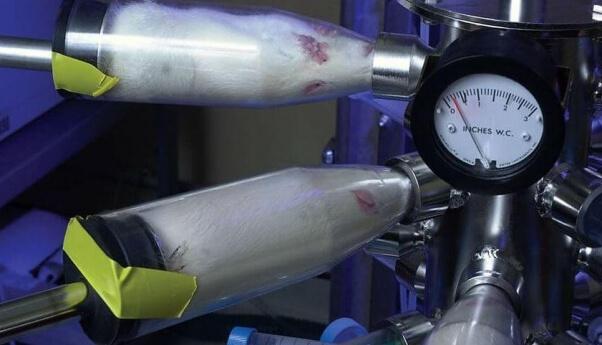MatTek Life Sciences launches model of the human lower respiratory tract

Credit: PETA International Science Consortium Ltd.
Ashland, Massachusetts – Researchers can now buy a first-of-its-kind human cell-based alveolar model to study the effects of chemicals and other substances on the deepest part of the lungs without forcing animals to inhale them.
The PETA International Science Consortium Ltd. provided MatTek Life Sciences with funding to develop EpiAlveolar – a three-dimensional model composed of human cells from the lower respiratory tract (the alveolar region). On one of its sides, the tissue can be exposed to the test material in the air, and on the other, it receives nutrients from a blood-like liquid – similar to the workings of a human lung.
EpiAlveolar can be used to study the effects of inhaling different kinds of substances, such as chemicals, nanomaterials, pathogens, (e-)cigarette smoke, and other respirable materials, instead of conducting tests in which animals are confined to small tubes and forced to inhale them for hours or months before being killed.
A report describing the EpiAlveolar model and its application to test the effects of nanomaterials – carried out at the Adolphe Merkle Institute at the University of Fribourg in Switzerland and Heriot-Watt University in Scotland – has been published in ACS Nano. The model is being further assessed under the EU Horizon 2020 project PATROLS as a promising tool to predict the health effects of long-term and repeated exposure to nanomaterials.
“EpiAlveolar is the latest example of how modern technology can replace animal tests and give us a better understanding of the human body,” says Dr Amy Clippinger, president of the Science Consortium. “We are proud to have partnered with MatTek on the development of this model and look forward to its contribution to life-saving research.”
“Part of our mission at MatTek is expanding the use of non-animal test methods through the development of human-relevant tissue models and test methods,” says Alex Armento, president and CEO of MatTek Life Sciences. “We were glad to have the PETA International Science Consortium’s support for the development of EpiAlveolar and look forward to future collaborations.”
As part of its larger initiative to replace animals in inhalation toxicity testing, the Science Consortium has also awarded international researchers inhalation exposure devices designed to be used with such cell-based models.
The PETA International Science Consortium Ltd. works to accelerate the development, validation, and global implementation of animal-free testing. It was established in 2012 to coordinate the scientific and regulatory expertise of its members – PETA US, PETA UK, PETA Germany, PETA India, PETA Netherlands, PETA France, PETA Asia, and PETA Australia. The Science Consortium and its members have donated millions of pounds towards helping to reduce and replace animal use.
Founded in 1985, MatTek Life Sciences is an in vitro life-science company based in the Boston area. The privately held company is an industry leader in the production of innovative three-dimensional in vitro human tissues used worldwide for non-animal testing across the cosmetics, chemical, and pharmaceutical industries. As an in vitro expert, MatTek has expanded its products and services to include the highest-quality glass-bottom cultureware, primary cells and media, and contract testing.
For more information, please visit PISCLtd.org.uk or MatTek.com.
###
Media Contact
Tasgola Bruner
[email protected]
404-907-4172
Original Source
https:/
Related Journal Article
http://dx.




